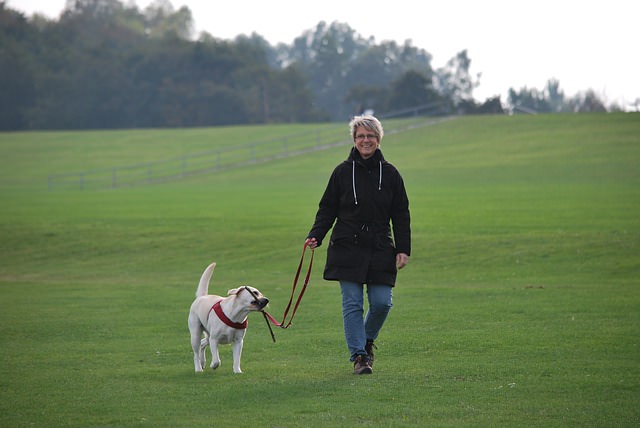A healthy level of activity is important at all ages, but when we reach late adulthood, it becomes imperitive for staving off obesity, diabetes, heart disease and arthritis.
English researchers from the University of East Anglia and the Centre for Diet and Activity Research at the University of Cambridge designed a study to find out if dog ownership provided significant motivation for older adults to exercise.

They found that owning or walking a dog was one of the most effective ways to ensure a consistently active lifestyle for aging citizens – even in cold, wet weather.
The study asked more than 3,100 older adults, ages 40 – 79, to wear an accelerometer that constantly measured their physical activity levels over a seven-day period. They were also asked to answer questions about their environment, age, education, gender, and health status.
18% were dog owners – two thirds of whom walked their dogs at least once daily. On average, the dog walkers were consistently more active, regardless of the weather, and those who reported good health were also more likely to be dog owners.

Lead author of the paper, Dr Yu-Tzu Wu, said:
“We know that physical activity levels decline as we age, but we’re less sure about the most effective things we can do to help people maintain their activity as they get older. We found that dog walkers were much more physically active and spent less time sitting overall. We expected this, but when we looked at how the amount of physical activity participants undertook each day varied by weather conditions, we were really surprised at the size of the differences between those who walked dogs and the rest of the study participants.”

While all of the participants were less active on colder, shorter, wetter days, the dog owners were far less affected by these conditions than the non-dog parents.
“We were amazed to find that dog walkers were on average more physically active and spent less time sitting on the coldest, wettest, and darkest days than non-dog owners were on long, sunny, and warm summer days,” project leader, Professor Andy Jones said. “The size of the difference we observed between these groups was much larger than we typically find for interventions such as group physical activity sessions that are often used to help people remain active.”
While most exercise programs encourage people to get active for themselves, dog owners have the additional motivation of tending to the needs of an animal. A factor that seems to make quite a difference.
Despite the positive health benefits of owning a dog, the study authors caution against running out to adopt a pet for an aging loved one as not everyone is willing or capable of caring for them.
H/T to University of Cambridge Centre for Diet & Activity Research
